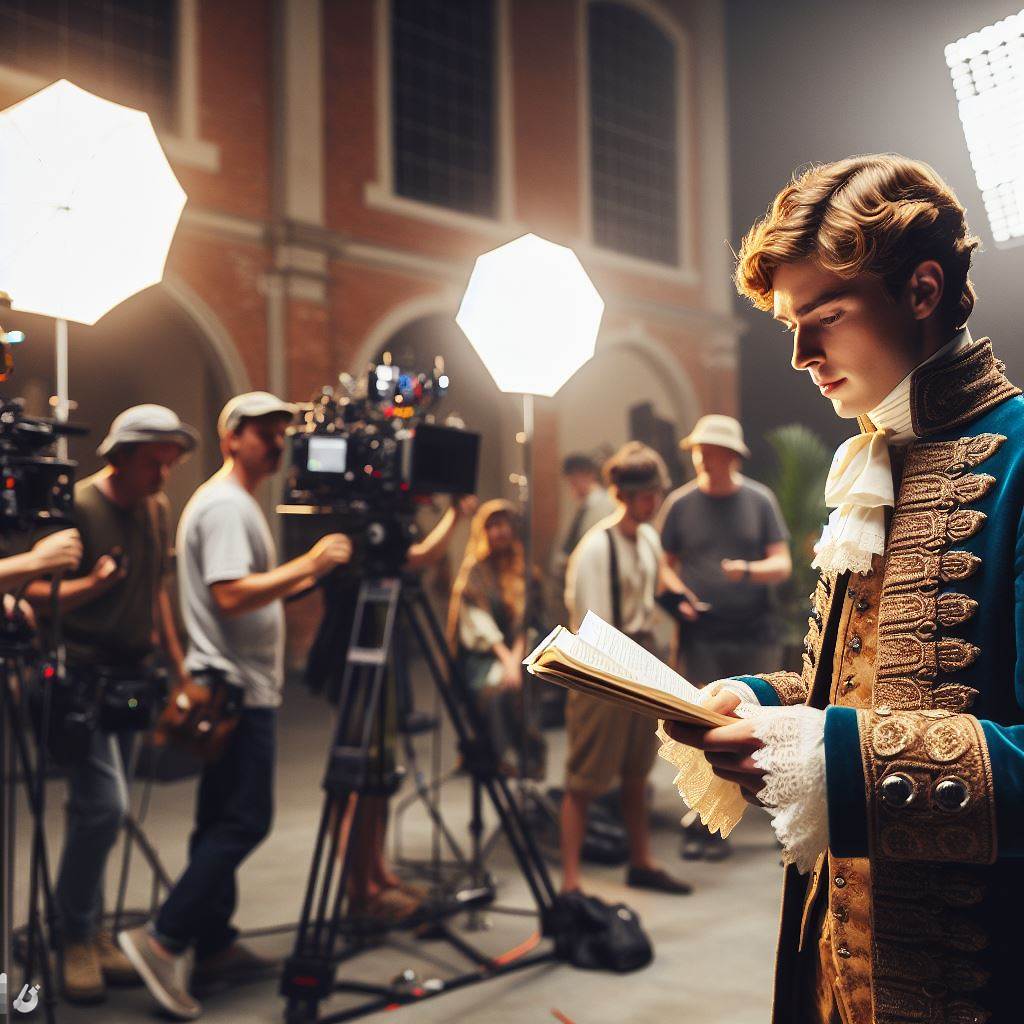Introduction
Accents play a vital role in the world of acting, allowing actors to fully immerse themselves in their roles.
Mastering accents can transform a performance and make it believable and authentic.
Brief Explanation of the Importance of Accents in Acting
Accents are crucial in acting as they help actors bring characters to life by accurately portraying their cultural background, social class, and regional identity.
Accents add depth, complexity, and realism to performances.
UK’s Diverse Acting Industry and the Need for Actors to Master Different Accents for Roles
The UK boasts a thriving and diverse acting industry, with productions reflecting various cultures, regions, and time periods.
Actors must possess the versatility to convincingly embrace different accents to portray characters from various backgrounds.
Whether it’s a Cockney accent for a character in East London or a posh British accent for a member of the upper class, actors in the UK must adapt their speech patterns to suit their roles.
The ability to master accents is a valuable skill that helps actors in the UK secure a wider range of roles and opens doors to international projects.
Actors undergo intensive training with dialect coaches, learning the nuances of specific accents and the variations within different regions.
They study phonetics, intonation, rhythm, and pronunciation to accurately capture the essence of each accent.
This attention to detail ensures that actors can seamlessly transform into characters and transport audiences into different worlds.
Basically, mastering accents is essential for actors in the UK.
Accents are a crucial aspect of character development, breathing life into performances and adding authenticity to the portrayal of diverse individuals.
With the ability to convincingly adopt different accents, actors enhance their versatility and increase their chances of success in the dynamic world of acting.
The Importance of Accents in Acting
Accents play a crucial role in the world of acting, contributing significantly to character development and establishing authenticity and believability in performances.
Personalized UK Career Consulting
Receive tailored career guidance designed just for you. Get actionable steps and expert support to boost your career in 1-3 days. Take control of your career now.
Get StartedLet’s explore the reasons why mastering accents is essential for actors.
Accents and Character Development
- Accents provide depth and richness to characters, giving them a unique voice and adding another layer to their personality.
- By mastering accents, actors can better understand their characters’ cultural backgrounds, beliefs, and even social status.
- An accent helps actors get into character, facilitating a more immersive and convincing portrayal on stage or screen.
- Accents create a distinction between characters, making it easier for the audience to differentiate and connect with them individually.
- The right accent can evoke emotions, convey a character’s origins, and enhance their overall development throughout a story.
Establishing Authenticity and Believability
- When actors accurately reproduce accents, it adds an element of realism to their performances.
- Accents give characters a sense of place, making them come alive and immersing the audience in their world.
- Mastering accents builds trust between actors and the audience, creating a more engaging and believable experience.
- An authentic accent helps actors avoid falling into stereotypes or perpetuating misinformation about certain cultures.
- By using accents effectively, actors can showcase their versatility and demonstrate their commitment to their craft.
The Process of Mastering Accents
- Actors often work with dialogue coaches or accent specialists to learn and perfect specific accents.
- They immerse themselves in the culture associated with the accent, studying pronunciation, intonation, and linguistic patterns.
- Listening to native speakers, watching movies, and even traveling to regions where the accent is prevalent can greatly aid the learning process.
- Regular practice and dedication are crucial to mastering an accent and making it sound natural and effortless.
- Actors continually refine their accents, seeking feedback and striving for authenticity in their performances.
Memorable Accents in Acting
- Meryl Streep is renowned for her ability to master various accents, from British to Polish, Italian to Australian.
- Daniel Day-Lewis received critical acclaim for his portrayal of American characters with impeccable accents.
- Cate Blanchett’s remarkable command over accents has led to captivating performances in films such as “Blue Jasmine” and “Elizabeth.”
- Eddie Redmayne’s portrayal of physicist Stephen Hawking showcased his impressive talent for accents.
- Actors like Benicio del Toro and Marion Cotillard also stand out for their exceptional mastery of accents in their respective roles.
Essentially accents are instrumental in creating well-rounded and believable characters.
They allow actors to delve deeper into their roles, establish authenticity, and captivate audiences with compelling performances.
Embracing the challenges of mastering accents is a testament to an actor’s dedication and commitment to their craft.
Read: UK Theatre vs. Film: Actors’ Varied Skills
Challenges Faced by UK Actors
The wide range of accents in the UK
UK actors face numerous challenges when it comes to mastering accents for their roles.
One key challenge is the wide range of accents within the UK.
From Cockney to Scottish, actors must learn to accurately portray various accents to bring their characters to life.
Understanding the different accents across the UK is crucial for actors.
The UK is home to a diverse range of accents, each with its own distinct characteristics.
For example, in London, the Cockney accent is commonly associated with the working class, with features like dropping the “H” sound at the beginning of words.
Aside from Cockney, there are accents like Geordie from Newcastle, Scouse from Liverpool, and Brummie from Birmingham, just to name a few.
Each accent brings a unique flavor to a character, adding depth and authenticity to their portrayal.
How actors need to master accents from different regions within the UK
To master accents from different regions within the UK, actors employ various techniques.
Your Dream Job Starts with a Perfect CV
Get a tailored CV and cover letter that captures your unique strengths and stands out in your industry. Let us help you make an unforgettable first impression.
Get StartedUse of dialect coaches
One common method is the use of dialect coaches.
These professionals specialize in teaching actors how to replicate specific accents accurately.
They focus on pronunciation, intonation, and other elements that define the particular accent.
Immersion into the culture and environment of the region they are trying to portray
In addition to working with dialect coaches, actors also immerse themselves in the culture and environment of the region they are trying to portray.
They listen to native speakers, watch films or TV shows set in the specific location, and even spend time in the area to pick up the accent’s nuances.
To ensure accuracy, actors often create lists of words or phrases that are unique to a particular accent.
These lists help them practice and familiarize themselves with the accent’s idiosyncrasies.
For example, actors studying the Scottish accent may practice phrases such as “wee” for small, “bonnie” for beautiful, or “aye” for yes.
Accurate accent portrayal goes beyond just pronunciation. Actors also need to grasp the cultural context of the accent they are using.
Understanding the history, socio-economic background, and influences on an accent helps actors deliver a more authentic performance.
Challenges
Aside from regional accents, actors often encounter challenges when required to speak in a specific time period’s accent.
Whether it’s a Shakespearean play or a historical drama, actors must learn accents from different eras, capturing the language and intonation of the time accurately.
While mastering accents can be challenging, it is a skill that distinguishes great actors from good ones.
Accurate portrayal of accents enhances a character’s believability and adds to the overall quality of a performance.
Optimize Your LinkedIn for Success
Boost your LinkedIn profile with a professional bio, keyword-rich headline, and strategic recommendations that attract recruiters. Stand out from the crowd and get noticed.
Optimize NowIn general, UK actors face numerous challenges in mastering accents for their roles.
With the wide range of accents in the UK, actors must understand the distinct characteristics of each region.
Employing techniques such as working with dialect coaches, immersing themselves in the culture, and creating lists of unique words and phrases helps actors deliver authentic performances.
Accurate accent portrayal adds depth and credibility to characters, enhancing the overall quality of a performance.
Read: Breaking into Film: UK Actors’ Early Steps
Training and Preparation
When it comes to mastering accents for roles, UK actors undergo rigorous training and preparation, ensuring their performances are authentic and convincing.
Actors understand the importance of accurately portraying accents in order to bring their characters to life and enhance the overall storytelling.
Overview of the Rigorous Training Actors Undergo
Actors participating in theatrical productions or film projects often devote significant time and effort to perfecting accents.
They study the specific accent required for their role and strive to become proficient in speaking it naturally and fluently.
This often involves intense practice sessions, where actors focus on the accent’s unique phonetics, intonations, and rhythm.
They also work on developing muscle memory to make the accent second nature, allowing them to effortlessly slip into character.
Various Resources Available for Learning Different Accents
UK actors have access to a variety of resources to aid in their accent learning process.
They can utilize online platforms, such as YouTube tutorials and accent training websites, to gain initial exposure to different accents.
Actors may also listen to audio recordings or watch movies and TV shows featuring native speakers of the accent they are studying.
These resources provide valuable auditory exposure, helping actors familiarize themselves with the accent’s unique sounds and characteristics.
Importance of Dialect Coaches in Helping Actors Perfect Accents
While self-study and resources play a significant role, the assistance of dialect coaches is invaluable to actors.
Dialect coaches are experts in phonetics and linguistics who work closely with actors to refine their accents.
They provide guidance, correcting any pronunciation mistakes and helping actors better understand the accent’s nuances.
Coaches also help actors grasp the cultural context and dialectical variations associated with specific accents.
Their expertise ensures that the actors’ performances are nuanced and accurate, respecting the cultural roots of the accent being portrayed.
Mastering accents for roles is a crucial aspect of an actor’s training and preparation process.
Through rigorous practice, exposure to various resources, and working with dialect coaches, UK actors are able to convincingly portray a wide range of accents.
These efforts contribute to the authenticity and believability of their performances, adding depth and richness to their characters.
Furthermore, their dedication to mastering accents showcases their commitment to their craft, elevating the overall quality of the production.
By continually honing their accent skills, UK actors ensure that their performances captivate audiences and bring stories to life in the most authentic way possible.
Read: The Real Life of UK Stage Actors Revealed

Techniques and Approaches in Mastering Accents for UK Actors
Accents play a crucial role in the portrayal of characters by actors.
To truly immerse themselves in the roles they take on, UK actors need to master different accents.
This section will explore various techniques and approaches that actors use to learn and excel at accents, highlighting the significance of listening to native speakers and imitating their speech patterns, the importance of phonetics, and the use of the International Phonetic Alphabet (IPA).
Listening and Imitating Native Speakers
One of the most effective ways to learn and master accents is by listening to native speakers.
Actors carefully study the speech patterns, intonations, and unique sounds of individuals from specific regions or countries to accurately replicate their accents.
They focus on the rhythm and melody of the language, ensuring their delivery feels natural.
By actively imitating the speech patterns of native speakers, actors can internalize the specific sounds and pronunciations associated with different accents.
This process helps them achieve authenticity in their performances, creating a more convincing portrayal of diverse characters.
The Importance of Phonetics and IPA
Phonetics is a crucial aspect of accent acquisition.
Understanding the sounds and sound patterns is essential for actors looking to accurately reproduce different accents.
The International Phonetic Alphabet (IPA) is a system that provides a standardized representation of these sounds.
Using the IPA, actors can break down accents into individual sounds, known as phonemes, and learn how to produce them correctly.
By studying and practicing these phonetic components, actors can fine-tune their accents and ensure their performances adhere to the specific vocal characteristics of a particular accent.
Techniques for Learning and Mastering Accents
There are several methods that actors employ to learn and master accents:
- Listening exercises: Actors listen to recordings of native speakers and mimic their speech patterns.
- Repetition: They practice speaking in the accent repeatedly to improve their fluency.
- Shadowing: Actors listen to native speakers and speak simultaneously to imitate their intonations and rhythm.
- Working with a dialect coach: Dialect coaches provide guidance and expertise, helping actors perfect their accents.
- Immersion: Some actors immerse themselves in the culture and environment associated with a specific accent to grasp its nuances.
Combining these techniques allows actors to develop a comprehensive understanding of accents, enabling them to convincingly portray characters from various backgrounds.
Challenges and Rewards
Mastering accents requires time, effort, and dedication.
Actors face challenges in accurately reproducing the intricate nuances and variations of different accents. However, the rewards are worth it.
Accurate accents enhance an actor’s credibility and bring depth to their performances.
A well-executed accent can transport audiences to different parts of the world and help build a more immersive and authentic experience.
It demonstrates the actor’s commitment to their craft and their ability to transform into different characters seamlessly.
Accents serve as powerful tools for actors, allowing them to embody characters from diverse backgrounds.
Through a combination of techniques such as listening to native speakers, utilizing phonetics and the IPA, and employing various learning approaches, UK actors can successfully master accents.
This dedication to achieving authenticity in performances helps to create memorable and impactful portrayals that captivate audiences worldwide.
Read: UK Actors’ Path: From Drama School to Stardom
Case Studies of Successful UK Actors
Mastering accents is a crucial skill for UK actors, and many have excelled in perfecting different accents for their roles.
Let’s take a look at some notable examples:
Benedict Cumberbatch
- Cumberbatch is known for his ability to convincingly portray various accents.
- He meticulously studies voice recordings to capture the nuances and cadences of different accents.
- His dedication to perfection is evident in his transformation into iconic characters like Sherlock Holmes.
Daniel Day-Lewis
- Day-Lewis is renowned for his commitment to character preparation, including dialect and accent.
- He immerses himself in extensive research, consulting linguists and accent coaches.
- Day-Lewis’s preparation, combined with his exceptional talent, has earned him critical acclaim and numerous awards.
Kate Winslet
- Winslet is recognized for her versatility in portraying characters with different accents.
- She spends considerable time perfecting the nuances of speech patterns for each role.
- Her attention to detail allows her to fully embody the characters she portrays.
Tom Hardy
- Hardy is known for his chameleon-like ability to adopt various accents.
- He undergoes extensive dialect coaching to accurately capture the accents required for his roles.
- Hardy’s dedication and skill in accent mastery contribute to his transformative performances.
Emma Thompson
- Thompson is praised for her impeccable accent work, seamlessly transitioning between characters.
- She employs a meticulous process of research and vocal exercises to achieve authenticity in her accents.
- Thompson’s commitment to linguistic accuracy adds depth and believability to her performances.
The success of these UK actors in mastering accents for their roles is a testament to their dedication and hard work.
Through thorough research, consultation with experts, and intense practice, they have achieved remarkable authenticity in their performances.
Their commitment to perfecting accents enhances their ability to fully bring characters to life on screen or stage.
Benefits and Career Advancement
When it comes to acting, mastering accents for roles can greatly benefit actors and open up new career opportunities.
It is a skill that can truly broaden an actor’s range and increase their marketability in the industry.
In fact, there has been a heightened demand for UK actors who can portray authentic characters from various backgrounds, emphasizing the need to develop this particular skill set.
Let’s explore the advantages and career advancement opportunities that come with mastering accents:
Expanded Range and Versatility
- Mastering accents allows actors to seamlessly adapt to a wider range of characters.
- By being able to convincingly take on different accents, actors can portray characters from various cultural backgrounds.
- This versatility showcases an actor’s ability to embody diverse roles, increasing their chances of landing different types of projects.
- Actors who can authentically portray characters with different accents are often considered highly skilled and sought after in the industry.
Greater Authenticity and Credibility
- Accurately mastering accents adds a layer of authenticity to an actor’s performances.
- When an actor can convincingly speak with the accent of a specific region, it enhances the believability of their character.
- This attention to detail and dedication to authenticity boosts an actor’s credibility and can lead to more impactful performances.
- Directors and casting agents value actors who can bring a genuine and immersive experience to their projects.
Increased Demand and Opportunities
- In recent years, there has been a growing demand for UK actors who can authentically represent characters from different cultural backgrounds.
- Actors who have mastered accents become valuable assets in productions that require a diverse range of characters.
- This demand opens up a wider range of job opportunities, including roles in films, television shows, and theater productions.
- UK actors who can convincingly portray characters with different accents have a competitive edge in auditions, increasing their chances of being cast.
Career Advancement and Recognition
- Mastering accents can lead to career advancement and recognition within the industry.
- Acclaimed performances in roles requiring specific accents can garner critical acclaim and award nominations.
- Actors who are recognized for their accent mastery often gain a reputation for their dedication and skill.
- This recognition can lead to more significant roles, higher pay, and increased opportunities to work with renowned directors and actors.
International Appeal
- With the globalization of the entertainment industry, actors who can master accents have a greater chance of reaching international audiences.
- By successfully adopting accents, actors can bring cultural diversity to their performances, appealing to a wider range of viewers.
- This international appeal can lead to opportunities for projects in different countries and collaborations with international filmmakers.
- Actors with a strong command of accents bridge cultural gaps and contribute to the global exchange of storytelling.
In essence, mastering accents for roles provides numerous benefits and career advancement opportunities for UK actors.
It not only expands an actor’s range and versatility but also adds authenticity, increases demand, and opens doors to international opportunities.
By dedicating time and effort to perfecting this skill, actors can truly stand out in the industry and achieve greater success in their careers.
Conclusion
Mastering accents is crucial in the UK acting industry.
Accents help actors bring authenticity and believability to their roles, making their performances more captivating.
It takes immense dedication and hard work for actors to achieve mastery over different accents.
They often undergo extensive training, work with dialect coaches, and spend significant time practicing and perfecting their accents.
However, the results are evident in the exceptional performances delivered by UK actors.
Their ability to seamlessly switch between accents showcases their versatility and professionalism, and sets them apart in the global acting arena.
As the demand for diverse characters and stories grows, accent mastery becomes even more important for actors.
It allows them to accurately portray characters from various regions and backgrounds, expanding their opportunities and contributing to the richness of storytelling on screen and stage.
In a nutshell, the importance of accents in the UK acting industry cannot be overstated.
It is a skill that requires relentless dedication and effort, but the rewards are immense, both for the actors themselves and for the audiences who are captivated by their performances.
[E-Book for Sale]
500 Cutting-Edge Tech Startup Ideas for 2024 & 2025: Innovate, Create, Dominate
$19.99 • 500 Tech Startup Ideas • 62 pages
You will get inspired with 500 innovative tech startup ideas for 2024 and 2025, complete with concise descriptions to help you kickstart your entrepreneurial journey in AI, Blockchain, IoT, Fintech, and AR/VR.




